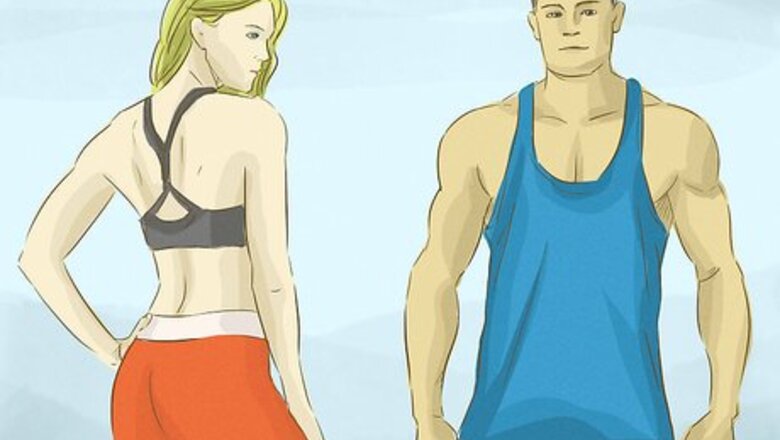
views
Looking Good While You Exercise
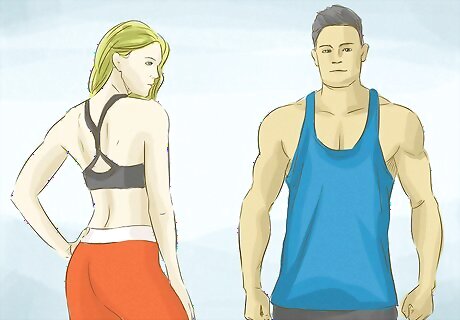
Dress for comfort. When it comes to picking your clothes for working out, comfort is king. Picking fabrics that allow you to move, bend, sweat, and lift comfortably is always a smart idea — if you feel better at the gym, you'll look better. Rather than relying on stuffy materials like denim, vinyl, polyester, and so on, pick breathable materials like cotton, bamboo, and artificial fibers designed for athletic wear to keep cool and comfortable while you work up a sweat. "Moisture-wicking" fabrics are an especially great choice for workout wear. These fabrics (which are usually artificial) transfer sweat to the outside of the fabric where it can evaporate, rather than trapping it against your body. When in doubt, layer. Wear several pieces of breathable clothing on top of each other and remove the outer items as you heat up and begin to sweat.
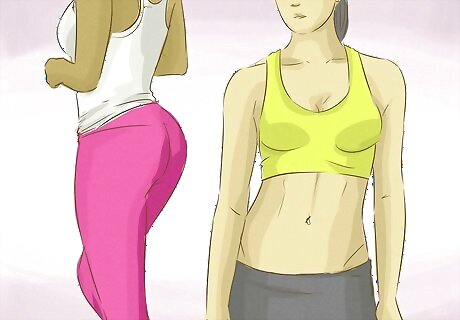
Flatter your natural figure. When you're at the gym, you have a little more freedom than normal for how tight or revealing your clothes can be. Make the most of this! For example, if you're a woman who's naturally curvy, a well-fitting sports bra and curve-hugging yoga pants can accentuate your natural assets. On the other hand, if you're naturally thin, you may want to go for a bare midriff to show off your toned midsection. Your ideal outfit will vary based on your body type — everyone's a little different! One sure-fire way not to flatter your figure is to wear a one-color outfit — this can give almost anyone a "saggy" look (as if they're wearing pajamas). A much safer bet is to wear one neutrally-colored garment (black, grey, etc.) and one colored one — this creates healthy contrast, highlighting your figure.
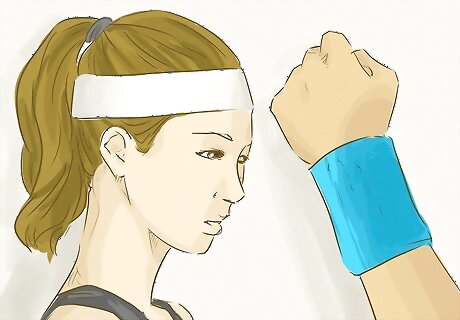
Use sweat-absorbing accessories. Some people who have a tendency to sweat a lot may find it beneficial to wear items of clothing that absorb sweat. Headbands, wristbands, ankle bands, bandanas, doo-rags, and other accessories can help keep sweat levels manageable, ensuring you look your best while you work out. For added effect, you may also want to consider wearing an antiperspirant deodorant to minimize the amount that you sweat and keep body odor low.
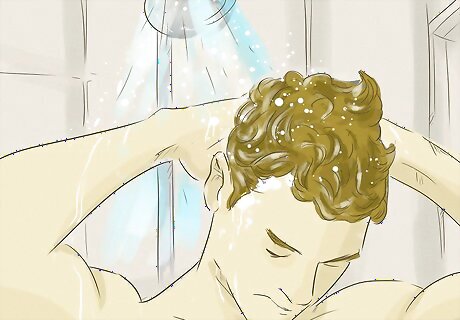
Have good gym hygiene. Looking attractive at the gym isn't all about the clothes you wear — it's also about the way you act and carry yourself. For instance, because any hygiene issues you have are likely to be especially noticeable once you start moving and sweating, it's important to take care of these issues both for your own benefit and that of the people around you. Below are just a few basic hygiene tips to keep you looking and feeling great at the gym: Clean your skin skin and hair daily or every other day. Bathe after every time you use the gym. Cover any cuts, scrapes, or sores with a suitable bandage. Wipe up excessive sweat with disinfectant after you finish exercising.
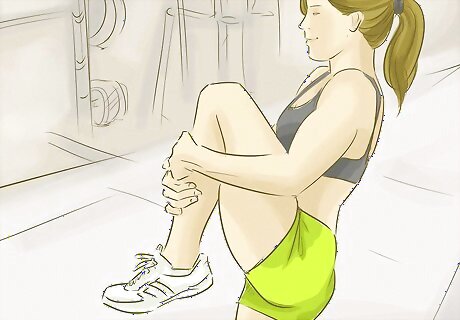
Make the most of your stretches. For many, stretching before and/or after exercise is a chore. If you're trying to look hot, however, this is your greatest opportunity! Stretching gives you the perfect opportunity to bend, twist, and contort in ways that flatter your figure. Don't be ashamed — there's no reason not to look as good as you can while you limber up. If your gym offers yoga classes, consider enrolling. A major component of yoga is flexibility, so you'll be doing lots of stretches, some of which are naturally flattering. On top of this, tight-fitting clothing is fairly common for yoga classes.
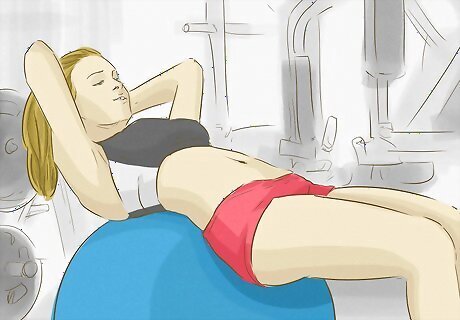
Pick achievable exercise goals. Let's be honest — most people don't look sexy when they're struggling to complete difficult exercises. Whether you're trying to max out on one more bench press rep or finish the last quarter-mile of your half marathon, there's a good chance you'll be a sweaty, grunting, panting mess. To look as good as possible, pick exercise goals you know you won't have to seriously struggle to complete. Finishing your exercise with a healthy level of effort usually makes you look great; barely crawling across the finish line or giving up on your last rep does not. This doesn't necessarily mean you should shy away from high-intensity exercise, however. If you want to look good, you'll need to strike a careful balance between picking exercises that are too easy — which can make you look like you're barely even trying — and those that are too hard.
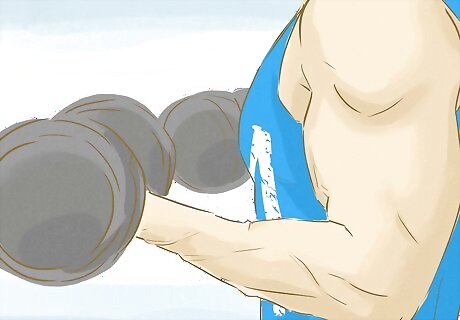
Know which exercises flatter specific body parts. Do you have one area of your body that you're particularly proud of — an area that's extra-hot? If so, show it off! Below are just a few potential "target" areas and some exercises that can highlight them: Arms: Bicep curls, tricep extensions, forearm curls Glutes: Squats, dead lifts Legs: Squats, lunges, running, cycling Chest: Bench press, flies, incline/decline press Stomach: Crunches, situps Back: Pull ups, rows
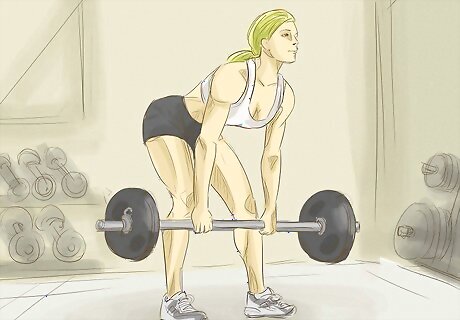
Use proper form. No matter how attractive you naturally are, you'll look like a gym newbie if you use improper form for the exercises you attempt. More importantly, using improper form can be unsafe, potentially leading to long-lasting injuries. To avoid this, ensure you tackle each exercise with perfect form and posture. If you're unsure of how to perform a certain exercise safely, talk to a staff member at the gym. Since there are nearly countless exercises that are possible at the gym, this topic is impossible to cover in-depth in this article, but here are just a few basic form and posture tips to start with — this list is by no means complete: When weightlifting, use only as much weight as you are able to lift and lower smoothly and comfortable. Keep an erect, upright posture when standing, sitting, and moving, but don't lock your knees. Don't rush or push yourself beyond your limit. Don't use a hunched or stooped posture of the neck and back, especially when exercising these muscles.
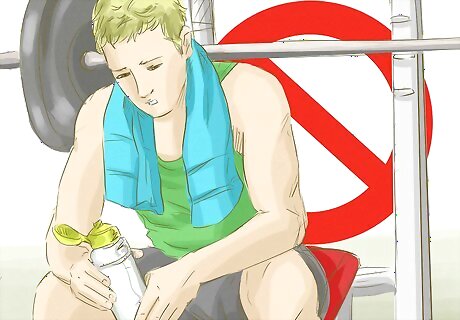
Don't rest at your machine. This is a common gym annoyance that's super-easy to forget about, but it can be a minor turn-off for other members if you're caught doing it. Resting at a cardio or strength-training machine is often seen as bad form (especially by "gym rats") because it keeps other people from using the machine unless they specifically ask you to move. This can make you look like a gym newbie or someone who's selfish, so avoid it if you can remember to do so. Instead, take a break between your sets by standing up, walking around, and, if desired, stretching. If you plan to resume your exercise at your machine, leave your bag or another personal possession next to it — this is a way of "claiming" it without preventing others from squeezing in a quick set.
Looking Good as a Woman
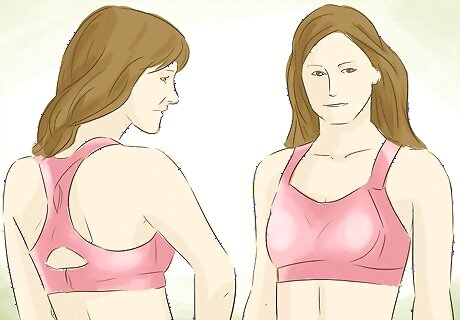
Use a sports bra. One good rule of thumb for women looking to perform heavy exercise is to invest in a comfortable, properly-fitted sports bra. Sports bras provide excellent breast support and prevent unwanted bouncing, making them especially valuable for activities like jogging, running, jumping rope, and so on. However, a sports bra has to fit properly to be beneficial — one that's too tight or loose will be uncomfortable and may not look as good. The benefits of sports bras aren't only in the way you look — some sports bras can provide additional comfort during exercise by wicking sweat away from the body, keeping you cooler. Some modern sports bras even have space for storing your belongings!
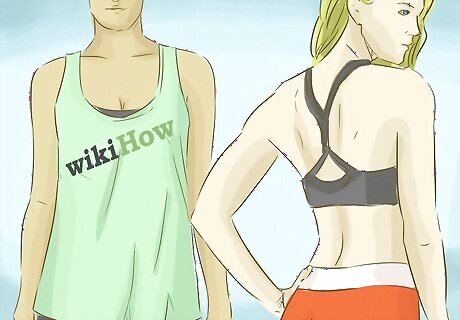
Wear either loose tops or close-fitting athletic wear. Women have many options when it comes to choosing a top for the gym — generally, both loose-fitting shirts (like tees) and tighter athletic wear are perfectly acceptable. If you're especially interested in looking good, you may want to consider wearing layers (such as wearing a track jacket over an inner tee or tank top) and pairing your colors accordingly, though this is by no means required. If these items aren't prohibited by your gym's dress code, you may also want to consider more revealing tops (like halter tops, etc.) if they're more breathable or comfortable for you. However, these sorts of tops aren't essential to have for a good workout.
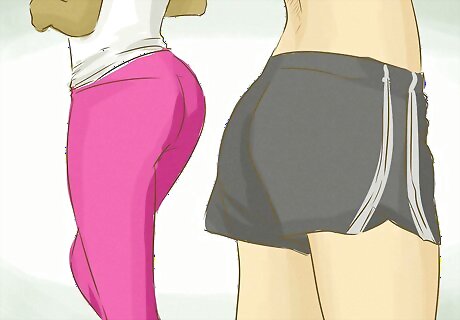
Wear shorts or exercise pants. Women also have a great deal of variety when it comes to the bottoms they can wear — sweats, yoga pants, tights, athletic shorts, and so on are all acceptable, so pick the option that's most comfortable to you. Generally, shorts are cooler than pants, so they're especially well-suited to cardio activities that may cause you to sweat a lot. If you're worried about embarrassing sweat marks on your pants, wear a dark color like black or navy blue for your pants — sweat won't appear much darker than the fabric itself on these items.
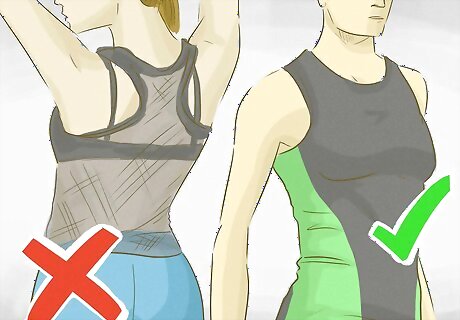
Don’t wear see-through materials. When you're worried about how you look, it's easy to forget that sweating at the gym is a good thing — it means you're working hard! However, a lot of sweat can turn some clothes (especially white clothes) semi-transparent. This can lead to embarrassing over-exposure, so try to wear darker colors or thicker fabrics to counter this effect if you expect to sweat a lot. If you have to wear thin white fabric to the gym, for obvious reasons, you will want to be extra-sure to wear a bra.
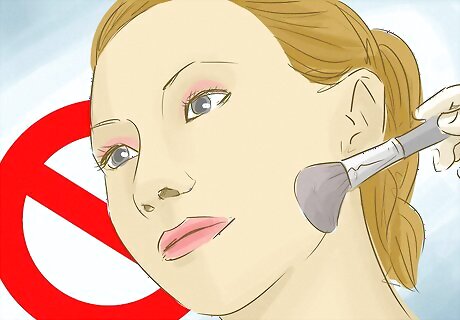
Don’t wear makeup. Generally, you'll want to skip your makeup before you go to the gym. Heavy makeup can be uncomfortable to wear during exercise, especially if you start sweating while you're wearing it. Even worse, sweat can cause your makeup to run, giving it a smudged, messy appearance. Since you should typically be going to the gym to work hard (and not to show off), the benefits of makeup usually don't make it worth it. Believe it or not, wearing makeup while you workout can also make you look worse in the long-term. Makeup can clog your facial pores while you sweat, leading to pimples, blackheads, bumps, and other blemishes that take time to go away.
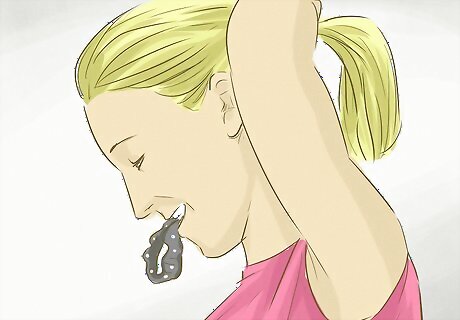
Don’t wear your hair loose. If you have long hair, letting it hang free while you exercise can sometimes be a problem. Loose hair can fall in front of your face while you run or play sports, impeding your vision and acting as a minor annoyance (not to mention giving you a messy, untidy look). Although rare, loose hair can also occasionally catch in certain types of exercise equipment (like weightlifting machines), resulting in serious injury. To avoid these problems, use a functional, tidy hairstyle like a ponytail or bun to keep your hair secure. If you don't want to bother fussing with your hair, another option is to use accessories like hair ties, bandanas, and hair wraps to keep it tied up. These also give you the opportunity to get creative with your fashion style!
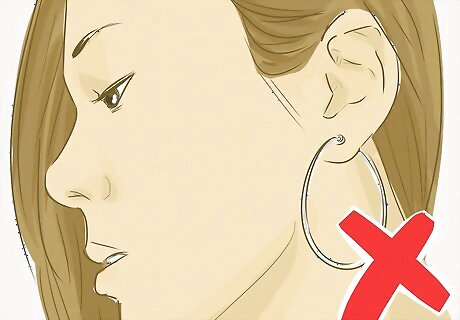
Don’t wear jewelry. Like loose hair, excessive jewelry can sometimes be a liability at the gym. While small, discrete stud earrings and rings aren't usually a problem, hoop earrings, bracelets, necklaces, and ankle bands can be dangerous if they make it hard for you to exercise properly or get caught in your equipment. The smartest policy is usually to leave these things at home — not only will you not have to worry about them, but you'll also avoid looking like someone who's more interested in their glamor than their workout. Another reason you may want to avoid bringing jewelry to the gym is the possibility of theft. If you leave your jewelry in a public locker room, there's a possibility it may be stolen, even if you use a lock. Leaving your valuables with the front desk is a wiser choice, but the only fool-proof way to keep your jewelry from getting lost or stolen is to leave it at home.
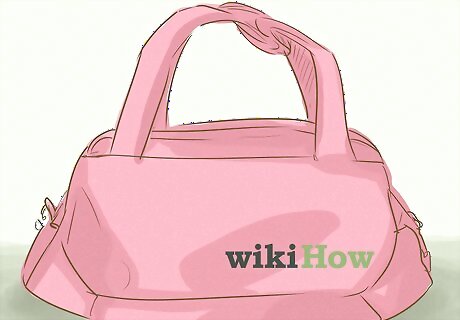
Bring a functional bag. An overflowing, stuffed-to-the brim purse can be like a ball-and-chain at the gym — not only is it a constant hindrance to your exercise routine, but also a yet another item you'll need to worry about losing or getting dirty. If you need to bring a bag, try using a small, functional sports bag. These usually offer more storage space than purses anyway and usually look fine even when they're dirty or sweat-soaked.
Looking Good as a Man
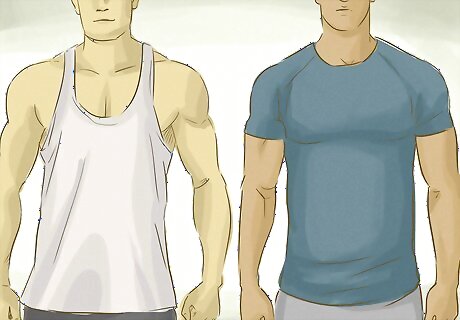
Wear a comfortable, breathable top. Compared to women, men have almost all of the same options for gym tops available (with the obvious exceptions of halter tops, etc.) Men at the gym look best in tops that are functional, comfortable, and breathable. Many men choose to wear ordinary cotton tee shirts, though, as always, modern moisture-wicking fabrics are an even more comfortable choice and usually look great as well. If you want to show off your arms, you also have the option of wearing an A-frame tee (tank top) or a sleeveless tee. These types of shirts sometimes even come with long slits along the sides to give a view of your abs and lats — though this style is sometimes considered "bro-y", it provides great ventilation and is not usually prohibited in gym dress codes.
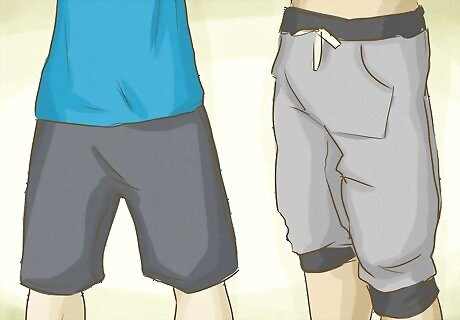
Err on the side of longer shorts. Generally, it's a little less acceptable for men to wear very short shorts to the gym than it is for women. Showing upper thigh can be considered a fashion faux pas unless a man is on a cross country team, so, if you typically wear shorts, it's usually best to opt for longer styles. Even shorts that hang past most men's knees aren't usually considered too baggy, so don't feel any need to shy away from longer styles.
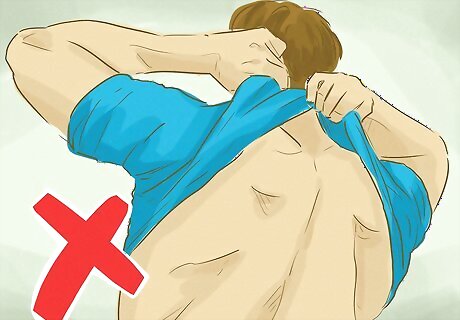
Don’t take off your shirt. While some men like to take off their shirts to cool down during a long jog or while playing sports, it's sometimes considered rude to do so at the gym. At gyms where this isn't common, taking off your shirt can make you look like a vain "meathead" in comparison to the other people exercising. In addition, if you get very sweaty when you exercise, removing your shirt can cause you to leave behind more sweat where you work out, which can gross out others. However, it's definitely worth noting that some men swear by the act of exercising shirtless, claiming it as a powerful motivating factor. If you're unsure whether it's considered rude to exercise shirtless at your gym, talk to the staff or simply observe the other members for a few days.
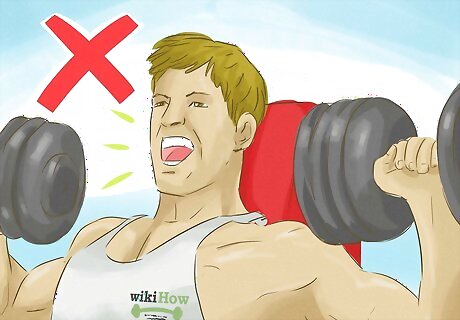
Don’t grunt or scream. Like taking off your shirt, letting out excessive noise while you exercise (especially while you lift weights) can make you appear vain or attention-seeking. It's also somewhat disrespectful of the people around you, for whom the extra noise may be somewhat awkward or intimidating. While some grunting may be unavoidable during heavy exercise, try to avoid loud grunts or screams to avoid giving the wrong impression of yourself.
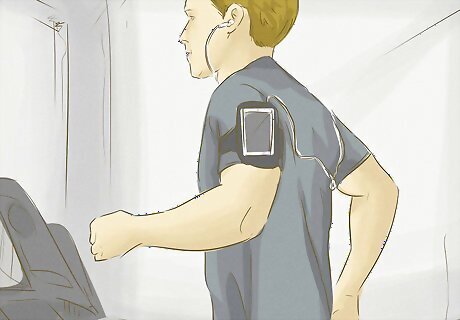
Don’t show off unneeded gear or accessories. The gym is for playing sports and exercising — not playing games of equipment one-upsmanship with other gym members. While it's perfectly acceptable to bring gloves, headbands, accessories, reading material, music playing devices, and anything else that makes your workout more comfortable or productive, these accessories shouldn't be a point of pride in and of themselves. Having a great workout is the focus of your visit to the gym — everything else should just be a tool to help you achieve this. One recent gym trend is the use of elevation training masks during exercise. These masks partially restrict the flow of oxygen into the lungs as the wearer trains, supposedly simulating the effects of training at a high altitude where oxygen in the air is limited. Though some claim great results, there is little (if any) evidence to support the claim that these devices make your lungs use oxygen more efficiently, making them not only a bizarre fashion choice, but also a likely waste of money.















Comments
0 comment